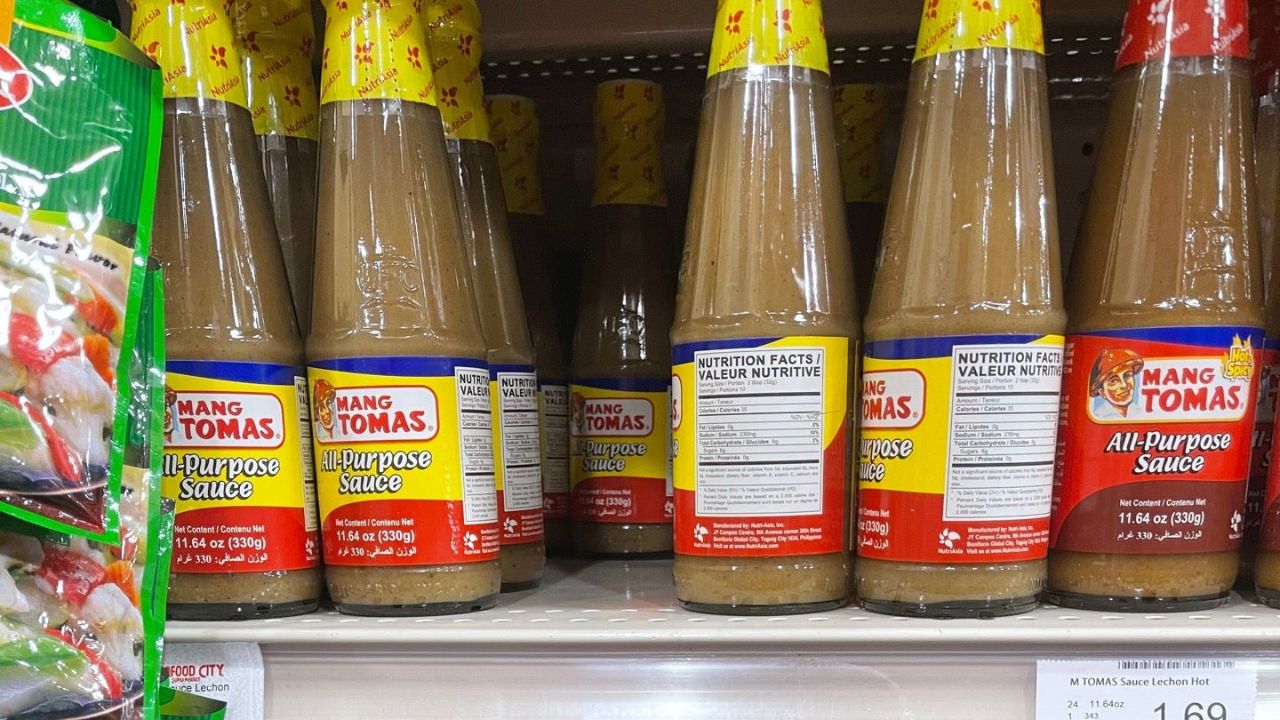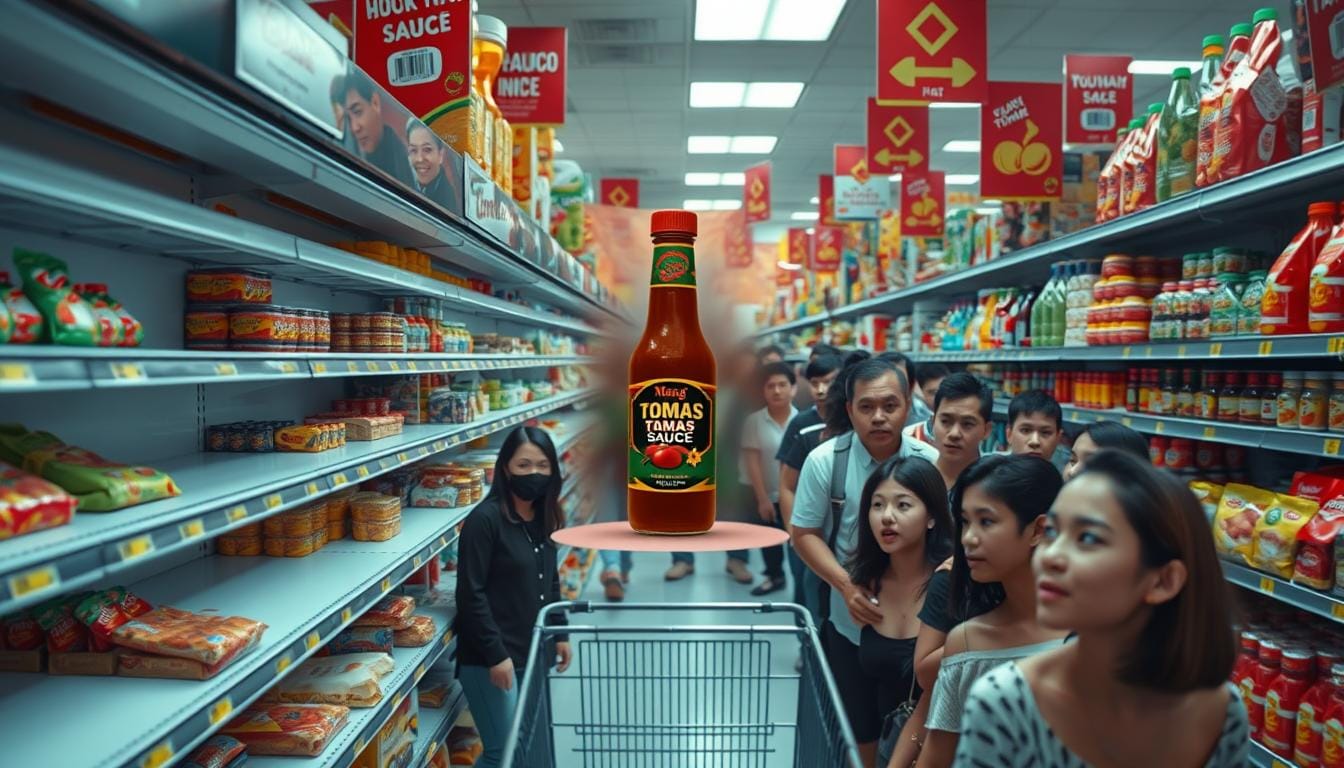Mang Tomas Ban? The Truth About Filipino Condiments In The US!
Is your favorite Filipino condiment about to disappear from American shelves? The panic surrounding a potential ban on Mang Tomas and other beloved sauces has gripped Filipino communities across the United States, triggering a wave of panic buying and leaving store shelves bare. The very thought that these culinary staples might be unavailable has sent shockwaves through the diaspora, raising questions about food safety regulations, cultural identity, and the lengths people will go to preserve a taste of home.
The frenzy began swirling online, fueled by social media posts and word-of-mouth anxieties. Elaine V, a Filipina residing in San Francisco and Las Vegas, ignited the concerns by asking her group chat, "\u201chave you guys heard that they are banning mang tomas and banana ketchup?\u201d Reports quickly spread that Seafood City in Las Vegas had run out of Mang Tomas lechon sauce, along with UFC and Jufran banana ketchup, intensifying fears of an impending shortage.
| Aspect | Information |
|---|---|
| Name of Creator | Tomas de los Reyes |
| Profession | Lechonero (Roast Pig Vendor) |
| Location | Quezon City, Philippines |
| Year of Origin | 1950s |
| Reason for Creation | To create a unique sawsawan (dipping sauce) to distinguish his lechon business from competitors. |
| Key Product | Mang Tomas Lechon Sauce (original recipe) |
| Legacy | The sauce became a popular Filipino condiment, widely recognized and enjoyed. |
| Reference Website | NutriAsia (Official Website) |
The heart of the issue lies in an import alert issued by the U.S. Food and Drug Administration (FDA). This alert targets food products, including dietary supplements, imported or offered for import into the United States that are deemed adulterated under Section 402(a)(2)(C)(i) of the Federal Food, Drug, and Cosmetic Act (FD&C Act) [21 U.S.C. \u00a7 342(a)(2)(C)(i)]. Specifically, the concern revolves around food additives considered unsafe under Section 409 of the act.
- Filmyfly Your Ultimate Guide To Free Movie Streaming In 2025
- Jameliz Benitez Smith Onlyfans The Truth Behind The Hype
One of the ingredients under scrutiny is potassium iodate. While commonly used as a dough strengthener in bread and rolls, and sometimes added to table salt to prevent iodine deficiency, its use in certain products has raised concerns. The question of which imported Filipino products contain potassium iodate has become a focal point of the controversy. The FDA has indeed placed import restrictions on Mang Tomas, Jufran, and other Filipino condiments due to safety concerns surrounding potassium iodate and butylated hydroxyanisole (BHA).
Adding fuel to the fire, social media users began claiming that Mang Tomas, a beloved banana sauce among Filipino Americans, was set to be banned in the US. This claim, though not entirely accurate, sparked panic among Filipino Americans, resulting in mass purchases of the sauce across supermarkets and stores in the US. Filipino expatriates across California and Nevada started stocking up, worried about future availability.
The situation escalated when a social media post by vlogger Cabalen Foodie on November 4 went viral, further amplifying the anxieties. Filipino TikTok user @dinocornel even criticized the perceived ban, exclaiming, "\u201ci don\u2019t know whose idea it is to ban mang tomas in america, but whoever you are, just know that the entire filipino community, read my lips, we don\u2019t like you,\u201d highlighting the shortage of his favorite condiment.
- Kannada Movies 2025 Discover New Releases Sandalwoods Best
- Anjali Aroras Ordeal Can She Recover The Deepfake Impact
However, amidst the heightened anxiety, its crucial to clarify that no formal ban on Mang Tomas banana sauce has been enacted. Shoppers can still purchase the sauce, although a recent ruling by the FDA has led to border holds for further review of these items. This means that while the products arent outright banned, they face increased scrutiny upon entry into the United States.
NutriAsia, the manufacturer of popular Filipino sauces like Mang Tomas, UFC, and Jufran, has responded to the concerns and resumed shipments to the United States after reformulating its products to comply with the new requirements set by the US Food and Drug Administration (FDA). The company stated that it adheres to all regulatory requirements of the countries to which it exports its products. These reformulated products were shipped in August but experienced delays due to global shipping challenges. One local shop even announced it had restocked these items on its shelves, providing some reassurance to anxious consumers.
The FDA's actions stem from concerns about "unsafe food additives." The agency has placed a DWPE (Detention Without Physical Examination) order on several products from the Philippines, including Mang Tomas, a popular sauce for lumpia. The ruling does not prohibit the sale of existing stocks but mandates that manufacturers reformulate their products to eliminate certain ingredients. This import alert has led to panic buying among Filipino communities in the United States, leaving some store shelves bare and causing a temporary shortage.
Despite the controversy, many are curious about the reasons behind the potential ban and the recall of Mang Tomas sauce. The concerns primarily revolve around its ingredients and perceived health risks. Updates indicate that the Mang Tomas sauce controversy affects several countries, prompting a global reevaluation of its safety and regulatory compliance.
Jay Agabao, manager of Sky Guam Distributors Inc., explained the impact of the import alert, stating in an interview with the Pacific Daily News, "\u201cwhen clients ask for these specific products, we have to inform them we can no longer import them.\u201d This highlights the immediate challenges faced by distributors and consumers alike.
The panic buying underscores the deep cultural significance of these condiments for the Filipino community. Banana sauce, also known as banana ketchup, has long been a beloved staple in Filipino cuisine. Mang Tomas, in particular, holds a special place as the original 1950s recipe created by Tomas de los Reyes, a lechonero in Quezon City. De los Reyes aimed to create a signature sawsawan (dipping sauce) to differentiate his lechon business from other lechoneras around town. This sauce has since become an integral part of Filipino culinary identity.
The absence of these key ingredients is a source of frustration for many. One user lamented that it "fcks up the flavor \/ overpowers the meat," highlighting the importance of these condiments in achieving authentic Filipino flavors. The situation underscores the importance of bagoong, an essential element of Filipino cuisine. Lifting any restrictions on bagoong would ensure that this vital ingredient remains accessible to Filipinos in the U.S.
The current status of Mang Tomas products is one of cautious optimism. While import restrictions remain in place, NutriAsia's efforts to reformulate its products and comply with FDA regulations offer hope that these beloved sauces will soon return to American shelves without the ingredients causing concern. The supplier has indicated that new shipments of Mang Tomas, ketchup, Jufran, and UFC products could arrive by the end of November.
In the meantime, Filipino communities are exploring alternatives and adapting their recipes to accommodate the temporary shortage. This situation has also sparked conversations about the importance of preserving culinary traditions while navigating evolving food safety regulations.
Ultimately, the Mang Tomas saga serves as a reminder of the power of food to connect people to their cultural heritage. It highlights the complexities of international trade, food safety regulations, and the emotional ties that bind communities to their favorite flavors. As NutriAsia continues its efforts to comply with FDA standards, Filipino Americans eagerly await the return of their beloved condiments, hopeful that they can once again enjoy the authentic taste of home.
The Mang Tomas sauce controversy is a multifaceted issue involving food safety concerns, regulatory actions, and cultural significance. While the panic buying may have subsided, the underlying issues remain relevant, and the Filipino community continues to navigate the challenges and uncertainties surrounding the availability of their beloved condiments.
The U.S. Food and Drug Administration has placed a DWPE order on several products from the Philippines, including Mang Tomas, a popular sauce for lumpia. This action doesn't halt the sale of existing stocks, it mandates manufacturers to reformulate their products to remove ingredients of concern.
Sought for comment, Nutriasiathe manufacturer of Mang Tomas, UFC, and Jufran productssaid it complied with all regulatory requirements of countries to which it exported its products. It said the reformulated products have been shipped in August but encountered delays in the course of global shipping.
Despite the heightened anxiety, no formal ban on Mang Tomas banana sauce has been enacted. Shoppers can still purchase the sauce, but a recent ruling by the agency means these items will face border holds for further review.
"When clients ask for these specific products, we have to inform them we can no longer import them," said Jay Agabao, manager of Sky Guam Distributors Inc., in an interview with the Pacific Daily News.
Lifting the ban on bagoong will ensure that a key element of Filipino cuisine remains accessible to Filipinos in the U.S. Bagoong is essential not only for its flavor; its a cornerstone of many dishes.
Nutriasia, the maker of popular Filipino sauces such as Mang Tomas, UFC, and Jufran, has resumed shipments to the United States after reformulating its products to comply with new requirements from the US Food and Drug Administration (FDA).
The supplier mentioned there might be new shipments of Mang Tomas, ketchup, Jufran, and UFC by the end of November, offering a glimmer of hope to those missing their favorite flavors.
This import alert has been developed for food products, including dietary supplements, that have been imported or offered for import into the United States that are adulterated under section 402(a)(2)(c)(i) of the Federal Food, Drug, and Cosmetic Act (FD&C Act) [21 U.S.C. 342(a)(2)(c)(i)] in that they are or contain any food additive that is unsafe within the meaning of section 409 of the FD&C Act.
Find out why Mang Tomas sauce and other Filipino condiments are under scrutiny in the U.S. and how it affects Filipino communities.
Learn about the ingredients, the FDA's import alert, the reformulation efforts, and the alternatives for your favorite dishes, as the Filipino community adapts to these changes.
- Guide Mkvmoviespoint Bollywood Movie Download Is It Safe
- Hdhub4u South Hindi Dubbed Your Guide Best Movie Tips

Mang Tomas Sauce Banned In US? Latest FDA Ruling Explained Times Now

Mang Tomas All Purpose Sauce Expiration Date Antonio Waint1977

Mang Tomas Sauce Banned The Latest Updates